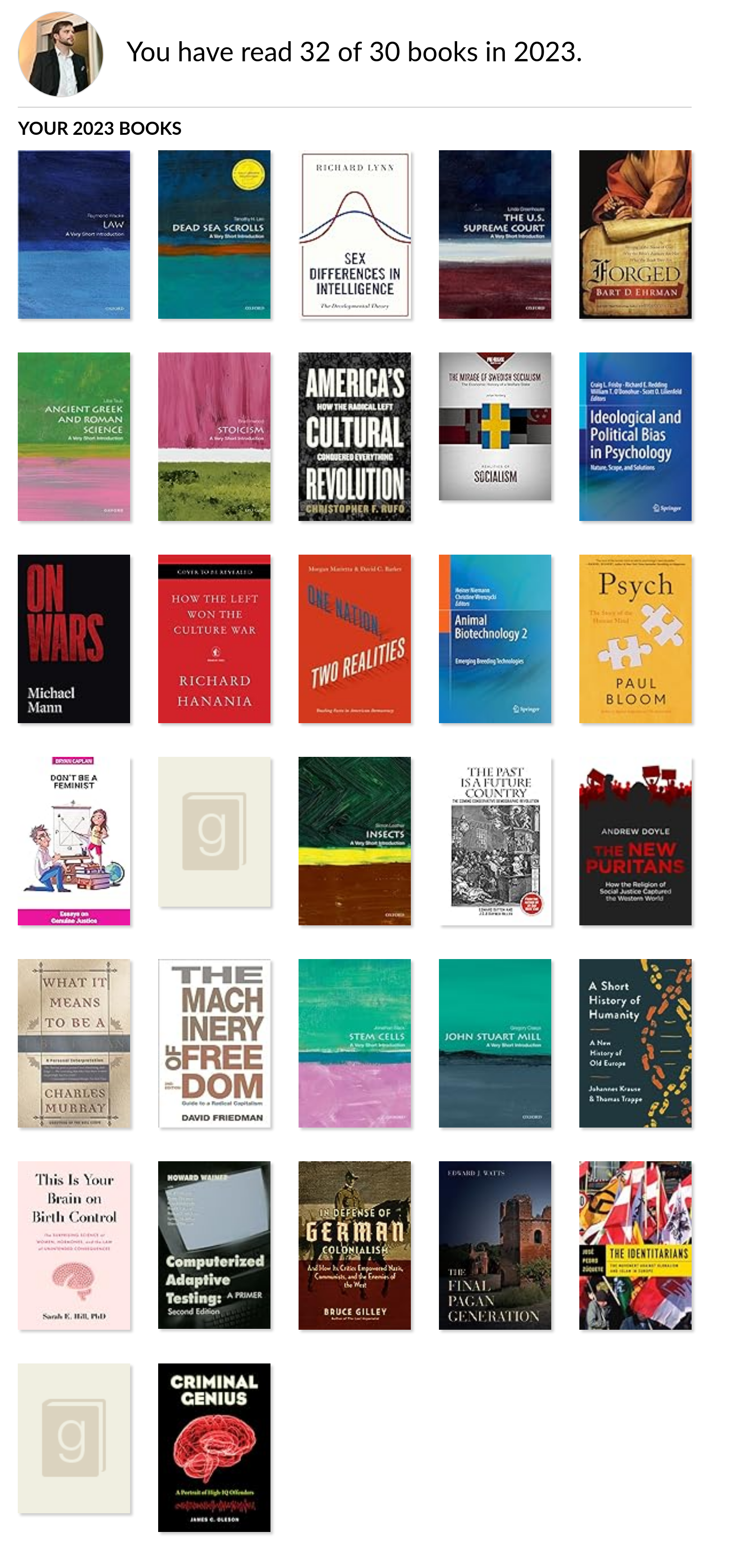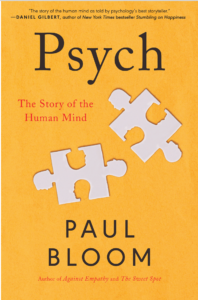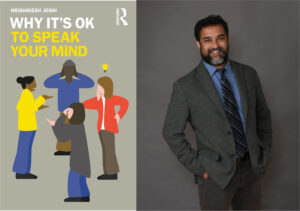It’s a new year, and therefore time to look back at what I read in 2023 in terms of books. Let’s start out with the overview.

Here’s an ultra short list of reviews, or links to my already posted full reviews.
- Law: A Very Short Introduction, Raymond Wacks,
- I got more interested in law from reading Hanania’s book, so I decided to brush up on this. This book is left-wing biased in the examples, but otherwise it’s excellent.
- The Dead Sea Scrolls: A Very Short Introduction, Timothy H. Lim,
- Spent some time recently arguing with Christians (why oh why) so decided to read up on the what these scrolls are about. I can’t say it was super interesting mainly because I wasn’t too interested in forgotten Jewish cults from around year 0.
- Sex Differences in Intelligence: The Developmental Theory, Richard Lynn
- Hanania recently wrote a post about this. I think Lynn was right. The book is just a slightly longer version of his existing papers. We are in the process of publishing a big meta-analysis of this question. We find the same thing as Lynn basically. Not much difference among children, growing male advantage starting around puberty.
- The U.S. Supreme Court: A Very Short Introduction, Linda Greenhouse
- Forged: Writing in the Name of God—Why the Bible’s Authors Are Not Who We Think They Are, Bart D. Ehrman
- Did you know that some of the books that are part of canon, the officially recognized books, are probably fraudulent, as in, not written by the claimed author but some later anonymous author? I don’t know what Christians say to this.
- Ancient Greek and Roman Science: A Very Short Introduction, Liba Taub
- We sometimes hear of the fantastic achievements of the ancients. This is true. The author somehow doesn’t include several of the perhaps most important, e.g. Achimedes almost inventing calculus.
- Stoicism: A Very Short Introduction, Brad Inwood
- My girlfriend calls me stoic. So why not read about stoicism. What modern readers will discover is that the OG stoicism was a fully fledged school of philosophy, not just some vague ethics notes about sucking up negative experiences.
- America’s Cultural Revolution: How the Radical Left Conquered Everything, Christopher F. Rufo
- The Mirage of Swedish Socialism, Johan Norberg
- A very interesting book on Swedish history. Like the author describes, I was under the misconception that Sweden is still quite socialist in economics. Apparently what happened is that Sweden almost went bankrupt due to too much socialism in the 1980s and 1990s, so much that the Social Democrats decided to needed reforms to bring in more capitalism. And it worked!
- Ideological and Political Bias in Psychology: Nature, Scope, and Solutions, Craig L. Frisby (Editor), Richard E. Redding (Editor), William T. O’Donohue (Editor), Scott O. Lilienfeld (Editor)
- I tweeted a lot of excerpts from this, but didn’t write the book review post apparently. It’s a massive undertaking. A 970 page edited book with chapters from all the usual dissident psychologists. They document all sorts of evidence of the left-wing biases in psychology and related fields. A very worthwhile compilation for those interested in the topic.
- On Wars, Michael Mann
- An interesting history on the causes of war throughout history. The author emphasizes the often irrational roles of leaders in starting these.
- The Origins of Woke: Civil Rights Law, Corporate America, and the Triumph of Identity Politics, Richard Hanania
- One Nation, Two Realities: Dueling Facts in American Democracy, Morgan Marietta, David C. Barker
- I read something that cited this relatively obscure book. It is based on a series of studies the authors did to study the effects of political ideology on belief in various facts.
- Animal Biotechnology 2: Emerging Breeding Technologies, Heiner Niemann (Editor), Christine Wrenzycki (Editor)
- It has good chapters of relevance to those interested in embryo selection.
- Psych: The Story of the Human Mind, Paul Bloom
- Don’t Be a Feminist: Essays on Genuine Justice, Bryan Caplan, Ashruta Acharya (Editor)
- It’s a Bryan Caplan essay compilation (i.e., republished old blogposts with some editing). It has some anti-feminist stuff, and a surprising amount of cringe open borders delusional takes. I guess one cannot read anything Caplan these days without having to read the obligatory 10% open borders lunacy. Let’s hope readers are not too convinced. If you are in doubt, start here.
- Intelligence and National Achievement, R. Cattell, Barbara Lerner, Daniel R. Vining
- There was a time before national IQs were a thing. Cattell was trying to spearhead this kind of work early on, and this one of early books on the topic. Only of historical interest, but a short read.
- Insects: A Very Short Introduction, Simon Leather
- I like reading about random science, so why not insects? I don’t think this had a lot of relevance for my work or general thinking, but insects are kinda cool, but I still am not enthused about eating them in large quantities.
- The Past is a Future Country: The Coming Conservative Demographic Revolution, Edward Dutton, J.O.A. Rayner-Hilles
- The New Puritans: How the Religion of Social Justice Captured the Western World, Andrew Doyle
- One of those books making the case that Woke, or Social Justice, is kinda sorta like a religion.
- What It Means to Be a Libertarian: A Personal Interpretation, Charles Murray
- Perhaps Murray’s most radical work. A short read on his plan for America from a libertarian perspective. The goal is to get rid of most of the state. The book has lists of all the things Murray would like to get rid of, and the few things he wants to keep.
- The Machinery of Freedom: Guide to a Radical Capitalism, David D. Friedman
- A most interesting book on extreme libertarianism. Friedman wants to remove the state entirely, and this book is a serious of essays on various ways this can be done. The best thing about this book is that it takes a staunchly consequentialist perspective. This is rare among extreme libertarians, who usually prefer weird deontology takes, or pseudoscience (praxeology).
- Stem Cells: A Very Short Introduction, Jonathan M.W. Slack
- I was involved with a potential startup on stem cell therapy, so it made sense to read up on this. It also has some relevance to embryo selection.
- John Stuart Mill: A Very Short Introduction, Gregory Claeys
- Mill famously wrote about liberty, and was an early feminist. But what else did he write? Well, a lot actually, we just don’t hear about it much.
- A Short History of Humanity: A New History of Old Europe, Johannes Krause, Thomas Trappe
- This Is Your Brain on Birth Control: The Surprising Science of Women, Hormones, and the Law of Unintended Consequences, Sarah E. Hill
- A kind of funny “you go girl!” book. The thesis is that women should accept all the supposed hormone fluctuations as a strength. The author provides the speculative evolutionary benefits of these. Certainly, this is better than the usual head in the ground denialism, but I doubt a lot of these findings would replicate.
- Computerized Adaptive Testing: A Primer, Howard Wainer, Neil J. Dorans, Ronald Flaugher, Bert F. Green, Robert J. Mislevy
- I am involved with some people building more effective cognitive tests. The most efficient approach known is computerized adaptive testing. With this approach, you don’t take the entire test of, say, 100 items. You start with an average difficulty item. If you get it right, you get a harder one. If you get it wrong, you get an easier one. The computer keeps giving you an optimally informative item to try until it has figured out where your ability level lies.
- In Defense of German Colonialism: And How Its Critics Empowered Nazis, Communists, and the Enemies of the West, Bruce Gilley
- The Final Pagan Generation: Rome’s Unexpected Path to Christianity, Edward J. Watts
- Often recommended by Razib Khan. It’s an odd history book. A series of biographies of people living in the later Roman empire as it converted to Christianity.
- The Identitarians: The Movement against Globalism and Islam in Europe, José Pedro Zúquete
- I met the author at some conference years ago. Naturally, this means I have to read his book. It’s amusing to think about the various people in this book. I’ve since met some of them, and right now the media is full of series of some of the other ones.
- Inequality of Man, Hans Jürgen Eysenck
- Eysenck was often years ahead of others. This book was one such example. Very readable, and of course, funny.
- Criminal Genius: A Portrait of High-IQ Offenders, James C. Oleson
- What do really high intelligence criminals look like? The author made an attempt at studying these by sampling Mensa etc. members with anonymous surveys. Not the most rigorous but perhaps the only game in town.
A number of these you might recognize because I wrote in depth book reviews of them.
Let me also mention here that Hanania is wrong about reading for most people. Reading books is good. Most people should read more books, not fewer. Reading short form writings doesn’t allow authors to give in-depth introductions to their perspectives on matters. Maybe if you are already reading 50+ or even 100+ books a year, it is better to cut back. But the average curious reader of Substacks reads fewer than 10 a year. It would be better for them if they scrolled Twitter less and read another 10 books a year. Here’s how to do it. 1) Buy a tablet. 2) Download books from Anna’s Archive. 3) Make a Goodreads profile to keep track and reach your goals. 4) Write your book reviews on your Substack!

